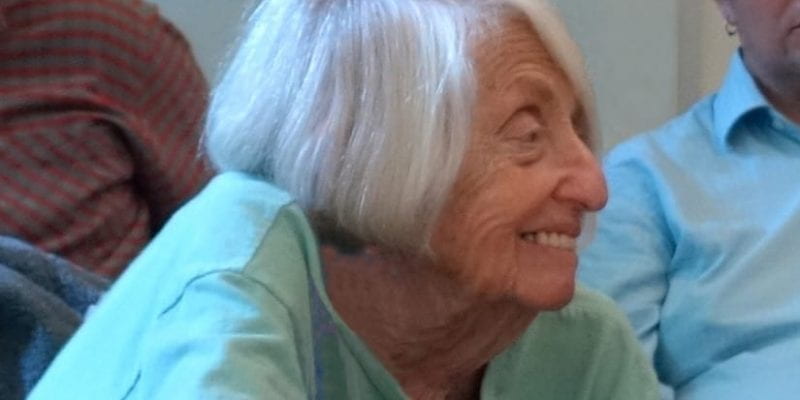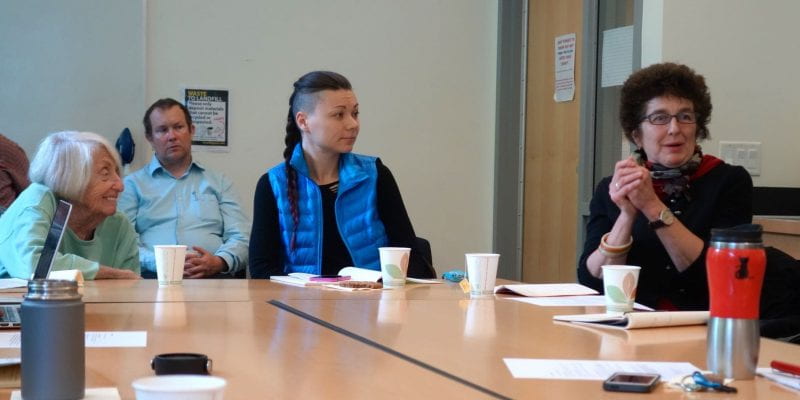

With Helene Moglen’s passing, Cultural Studies at UCSC has lost a founding visionary and a loyal supporter. Many of us will miss her original, probing intellect, relentless questioning, and deep conversations.
When Hayden White and I arrived at UCSC in 1978, Helene was just taking up a position as Dean of the Humanities (the first female Dean in the UC System). A committed feminist, Helene built a program in Women’s Studies (as it was then called), putting our campus in the forefront of an emerging field. Helene quickly authorized two senior positions (both held in History of Consciousness) defined simply as “Feminist Theory,” a first for this recruitment focus. The appointments of Donna Haraway and Teresa de Lauretis in the early 1980s brought science/technology studies and psychoanalysis/queer theory into the mix of feminist work at UCSC. An exciting network of scholars and students from all the University’s divisions was coming together.
As Humanities Dean and simultaneously Provost of Kresge College (plus, for a time, Dean of the Arts!) Helene energetically promoted work across disciplines and divisions. She was interested in new thinking that challenged established ideas and institutional power–including (at least in principle) her own. I recall a bumper sticker on the door of the Dean’s office: “Question Authority.” I wonder how many administrators today would lead with that message?
By encouraging Women’s Studies, History of Consciousness, American Studies, and much else, Helene prepared the interdisciplinary soil where Cultural Studies would take root. She supported the Center, which was founded not long after her term as Dean. And over the years, she was a frequent participant in its collaborative projects.
Helene’s writing and teaching opened up orthodoxies and questioned limits. Her commitment to feminist work was unshakable, sharpened by an activist sensibility. A fearless critic of abusive power, she could be counted on to speak out, and organize on behalf of the causes she believed in.
Helene’s scholarship was radical in its implications, while grounded in close readings and literary history. Her early books, one on Lawrence Sterne, the other on Charlotte Bronte, prepared the way for a far-reaching, revisionist work, published in 2001: The Trauma of Gender: A Feminist Theory of the English Novel. This brilliant book interrupts canonical accounts of the “rise of the novel,” exploring a more ambivalent, fraught story of the emerging bourgeois self and sex-gender system: masculine normativity and its traumas. From her perspective, the realist novel can’t be separated from its shadow-genre, the fantastic. Complex readings of Defoe, Richardson, Sterne and Walpole track this “bi-modal” formation. Helene’s psychoanalytically-informed feminist theory guides the readings, while not explaining away the excessive, imaginary processes that are her principal concern. We can follow the ways that desire, melancholic loss, and impossible outcomes are played out in fictional form. If the progressive story of the realist novel is re-written “in the fantastic mode,” she argues, “psychic pain and developmental deformations are exposed, and the traumas of individuation and gender acquisition are laid bare.” (p. 139)
Helene’s teaching extended this subversive re-telling of literary history. Along with regular offerings on “Women Writers,” she taught a graduate seminar on “The Fantastic” (a neglected genre, only now gaining recognition thanks to Ursula K. Le Guin, Neil Gaiman, China Miéville, et al.). And she offered a perennially-popular lecture course: “The Gothic Imagination in Film, Fiction, and Theory.” Among its readings were books by Joseph Conrad, Sigmund Freud, Mary Shelley, Bram Stoker, Toni Morrison and Art Spiegelman, plus the films Alien, Apocalypse Now, Blue Velvet, and Sweetie. Very much a “cultural studies” mix.
Helene’s view of the critical importance of fantasy and the gothic is summed up in this passage from The Trauma of Gender (pp. 110-11).
“…Fantastic narratives deconstruct the boundaries that separate legitimated elements of the hegemonic culture from their illegitimate others (e.g. the integrated from the fragmented self, sanity from madness, rationality from irrationality, social sameness from difference, and defined from indeterminate meanings). The gothic novel shares in this larger deconstructive project, mediating between an older romance tradition, whose metaphysical and social assumptions it cannot share, and an emergent tradition of the fantastic, which is overtly psychological in perspective. From that intermediary position, gothic texts portray the horrifying emptiness of a secularized world. Representing irrational impulses, they do not claim access to a higher integrative truth but attest to meanings that elude language and analysis. For a cosmos composed of interlocking segments hierarchically arranged, they substitute a disjunctive universe in which secrets of the past impose themselves upon a fearful and bewildered present.”
A restless intellect–always thinking and questioning. Helene wrote for several hours every morning, right up to the time of her final health crisis. She was in the midst of teaching (with her partner, Sheila Namir) a writing seminar for Veterans, something they had undertaken multiple times. Almost every Wednesday, Helen and Sheila could be found at the Cultural Studies Colloquium. (It was her wish that people making posthumous contributions in her name send them to the UC Santa Cruz Center for Cultural Studies.)
Helene sustained many friendships and ongoing discussions with people of all ages, from small children to Emeriti. She always wanted to know what you were thinking and feeling. She asked to see work-in progress and, as many of us know, always responded rapidly and fully. Her friendships were thick with ideas, with psychology, with politics, with caring…
A photo of Helene, taken at the Wednesday colloquium, reveals something of her characteristic engagement, curiosity, and delight. Looking at the image, one of her friends remarked: “That’s Helene. Leaning forward to grasp the human with the thought.”
Jim Clifford is Distinguished Professor Emeritus of the History of Consciousness Department. Read Donna Haraway’s reflection on Helene Moglen, or learn more about The Helene Moglen Lecture in Feminism and Humanities.
